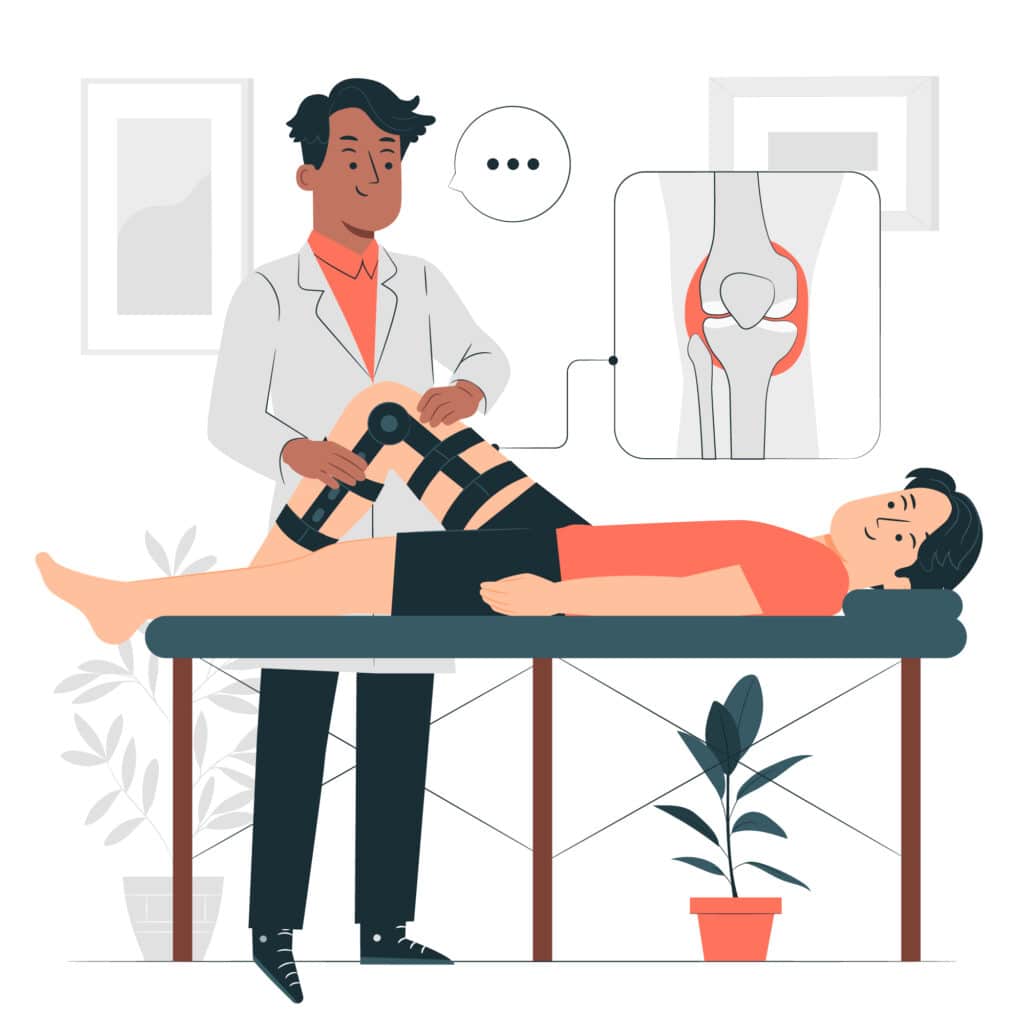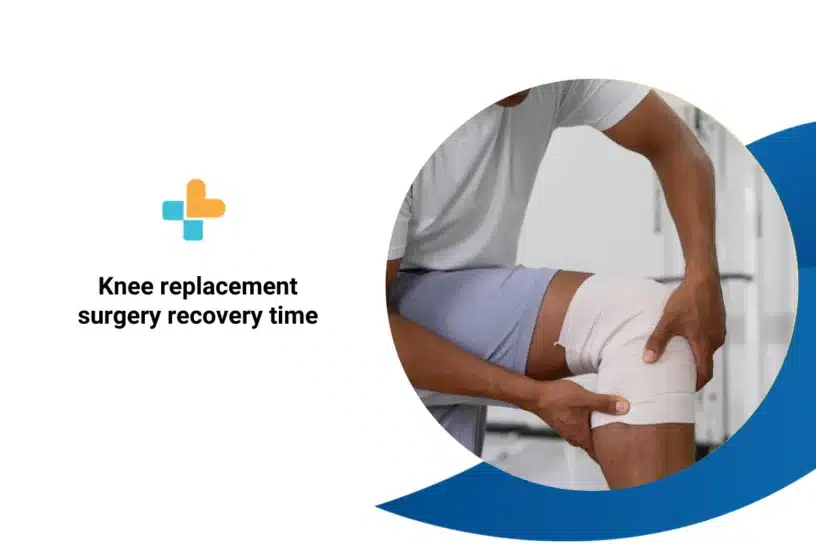Recovery and rehabilitation play a vital role in the post-surgery phase of total knee replacement (TKR). During this stage, the goal is to regain mobility and resume an active lifestyle. It’s important to note that protocols may vary among surgeons, and each individual’s recovery is unique. However, the following overview provides a general timeline for the recovery process.
The period of 12 weeks after surgery holds significant importance for effective recovery and rehabilitation. It is crucial to adhere to a well-defined plan and motivate oneself to accomplish daily tasks to facilitate faster healing and enhance long-term success.
This blog highlights the information about knee replacement surgery recovery time.
Day 1 after knee replacement surgery
Rehabilitation usually starts as soon as a you wake up from TKR surgery. After the surgery, a physical therapist will assist in standing up and walking using assistive devices such as walkers, canes, or crutches. The physical therapist will also guide you about getting in and out of bed and moving slowly.
The physical therapist may also introduce the use of a continuous passive motion (CPM) machine to gently move the joint. Within the first 24 hours after surgery, starting physical therapy and following the prescribed plan of exercises to be done at home is recommended. While some pain, swelling, and bruising are expected, it’s important to gradually use the knee and adhere to the instructions of the surgeon and physical therapist.
During the first 48 hours, the main goal is to fully extend the knee and, if possible, progressively increase knee flexion by around 10 degrees. The healthcare team will provide guidance and help set realistic goals for recovery.

How Do You Shower After Knee Replacement Surgery
After knee replacement surgery, your doctor will tell you the right time to shower. If the dressings used by the surgeon during the surgery are waterproof, you may be able to shower on the day or about a few days after the surgery. However, it is advised to wait longer before showering in case of non-waterproof dressings.
To ensure proper incision healing, avoiding soaking your knee for 3 to 4 weeks is advised, as recommended by the American Association of Hip and Knee Surgeons (AAHKS).
The First Week After Knee Replacement Surgery
To improve mobility and range of motion after knee replacement surgery, following the daily exercise routine plan as prescribed by your physical therapist is recommended. This routine may comprise gait training that will help restore your walking pattern, exercises to increase your range of motion, and gradually regaining strength.
Before starting with high-impact exercises, it is important to begin with lower-intensity exercises and gradually progress to high-intensity strength training, under the guidance of your physical therapist and surgeon, typically during the first week after your knee replacement surgery.

However, it is crucial to avoid pushing yourself too hard. Your body needs time. Hence, don’t push yourself hard and wait till your body is ready. If you experience severe pain while exercising, feel sore for longer than usual after a workout, or notice any unusual swelling, it is essential to stop training and consult your healthcare provider and physical therapist immediately.
It is important to adhere to your doctor’s instructions to manage pain after surgery, including taking pain medication as prescribed, using ice packs, and elevating your leg as recommended.
The Three Week After Knee Replacement Surgery
By this stage of your recovery, it is likely that you have gained enough progress to walk and stand for extended periods, surpassing the 10-minute mark. Daily activities such as showering or getting dressed should also be more manageable and less strenuous. It indicates an improvement in your mobility and overall condition.
By this time, you’ve probably transitioned from using a walker to get around to utilizing a cane or even walking without any assistance. This proves that your strength and stability have increased, enabling you to move around with little to no assistance.
Most people no longer require prescription medication to manage post-operative pain by the third week after surgery. This shows that your body is recovering from surgery and doing well, and the pain is progressively going away. As you start to rely less on medicine to relieve discomfort, it represents a significant step forward in your healing process.
Week 4-6 After Knee Replacement Surgery
If you have diligently followed your exercise and rehabilitation regimen, you should notice a significant improvement in your knee, including increased bending ability and strength. The swelling and inflammation in your knee should have also subsided by now.
At this stage, the primary objective is to enhance your knee’s strength and range of motion through physical therapy. Your physical therapist may recommend longer walks as part of your therapy sessions. In most instances, you will no longer require a cane or any assistive device to move around.
It is an opportune time to discuss resuming your regular work and daily activities with your physical therapist and surgeon. Ideally, you should start feeling a sense of regained independence during this phase. Towards the end of this period, you will likely be able to walk longer distances and accomplish more everyday tasks.
For those with desk jobs, a return to work can typically be considered within 4 to 6 weeks. However, if your job involves walking, traveling, or heavy lifting, resuming it may take longer.
Some individuals may be able to resume driving within 4 to 6 weeks after surgery, but it is crucial to consult your surgeon before doing so. It is essential to avoid driving if you are still taking narcotic medications for pain management. In most cases, travelling can be done after 6 weeks. However, prior to this timeframe, prolonged periods of sitting during travel could increase the risk of developing a blood clot. It is important to adhere to the advice of your healthcare provider regarding travel recommendations.
Week 7 to 11 After Knee Replacement Surgery
You will continue with physical therapy for a duration of up to 12 weeks, or potentially longer, as determined by your healthcare provider. During this period, your primary goals will be to rapidly enhance your mobility and range of motion, possibly aiming for a range of motion of 120 degrees, as well as strengthening the muscles surrounding your knee.
Your physical therapist will make the required adjustments to your exercise routine as your knee improves. Some exercises that may be included are:
- Mini squats
- Leg balances
- Toe and heel raise
- Hip abductions
- Bicycling on a stationary bike
- Step-ups
As you progress with your rehabilitation, keeping up your strict workout regimen is crucial. How diligently you commit to therapy will influence how soon you may resume your normal routine and the knee’s long-term functionality.
By this time, you should be well on your way to recovery, experiencing significantly less stiffness and pain. You can progressively take part in more physical activities, including walking, swimming, and biking. These activities can support continued development and general well-being.
Week 12 After Knee Replacement Surgery
It is vital to exercise and remain consistent during week 12 of your rehabilitation. Refraining from high-impact activities that can damage your knee or the tissues around it is crucial. Some of these activities may include running, cycling, aerobics, etc. It is important to inform your doctor before doing any new activities.
At this stage, you should experience a significant reduction in pain or even be pain-free. Regular communication with your healthcare team is crucial to ensure proper supervision and prevent any potential setbacks. Getting their approval and direction is usually advisable before beginning any new activity.
Week 13 After Knee Replacement Surgery
You will gradually see improvements in how your knee functions and decreased pain over time. The American Association of Hip and Knee Surgeons (AAHKS) estimates that it can take up to three months for you to fully resume most activities and between six and twelve months for your knee to recover to its full strength and resilience.
How long does a knee replacement usually last?
According to studies, knee replacement will likely last 10 years with a 90 to 95 percent chance and 20 years with an 80 to 85 percent chance.
To ensure the ongoing health of your knee, it is important to follow your healthcare provider’s recommendations regarding follow-up visits diligently. Typically, most individuals continue to have follow-up appointments throughout the first year after surgery. Still, your medical team will inform you when you no longer need to come in for checkups.
It is worth noting that many people who get a total knee replacement surgery report positive outcomes. By adhering to your rehabilitation plan, you can aid in a faster recovery from the surgery. However, it’s important to remember that recovery timelines can vary for each individual. Your surgeon and physical therapist will guide you and provide the necessary information on when it is safe to resume household tasks, return to work, and engage in other activities based on your specific progress and condition. Following their guidance will ensure a smoother and more successful recovery process.
Conclusion
Knee replacement surgery is a critical procedure, and it may take about 12 weeks for the patient to recover after it fully. To ensure a speedy recovery, healing, and better surgical outcomes, it is important to follow the rehabilitation plan given by your doctor. It is essential not to start any exercise routine without seeking proper guidance from your surgeon and physical therapist. Depending upon your health, the extent of surgery, and various other factors, your physical therapist will provide you with the right rehabilitation plan to recover quickly and restore your mobility after a knee replacement surgery.
Ayu Health Network of Hospitals is renowned for providing exceptional treatment for knee replacement surgery, all at an affordable price. Our dedicated team of experienced doctors and physical therapists is committed to delivering our patients the highest standard of care. We understand the importance of a comprehensive rehabilitation plan in ensuring a speedy recovery, and our skilled professionals work closely with each patient to develop personalized rehabilitation programs tailored to their specific needs. To know more, visit our website at www.ayu.health.
Frequently Asked Questions
1. How painful is knee replacement surgery recovery?
The pain experienced during knee replacement surgery recovery can vary from patient to patient. While the surgery is performed under anesthesia, the post-operative period can involve some discomfort and pain as the body heals. The level of pain experienced depends on several factors, including the individual’s pain tolerance, overall health, and the extent of the surgery. Although there might be some pain in the initial days, your doctor will provide you with appropriate pain-relieving medications to help alleviate the pain.
2. What is the fastest way to recover from knee surgery?
There are no fastest ways to recover from knee surgery. Getting adequate rest, balancing movements, mild exercises, cold compression, physiotherapy, and a good diet are essential in recovering quickly after knee surgery.
3. What should I expect 3 months after knee replacement?
You can expect to notice a noticeable improvement in your knee function and general improvements about three months after your knee replacement surgery. There may be variations in individual experiences; some of the changes that you can expect to see may include,
- Reduced pain
- Decreased or mild swelling
- Ability to walk without the need for a cane or walker
- Normal sleeping state
- Increased mobility
4. How long does it take an 80-year-old to recover from knee replacement surgery?
The time taken to recover from knee replacement surgery for an 80-year-old may be a little longer. They may take around 12 weeks or more to recover. However, the recovery rate in the elderly may differ significantly depending on various factors such as their age, overall health, the extent of surgery, etc.
Our Hospital Locations
Orthopaedics Surgery Hospitals in Chandigarh | Orthopaedics Surgery Hospitals in Bangalore | Orthopaedics Surgery Hospitals in Jaipur | Orthopaedics Surgery Hospitals in NCR | Orthopaedics Surgery Hospitals in Hyderabad
Our Doctors
Orthopaedics Surgery Doctors in Chandigarh | Orthopaedics Surgery Doctors in Bangalore | Orthopaedics Surgery Doctors in Jaipur | Orthopaedics Surgery Doctors in NCR | Orthopaedics Surgery Doctors in Hyderabad
About the Author

Dr. Manjunath Kumar K.
Dr. Manjunath Kumar K. is a renowned Orthopaedics currently practicing at Ayu Health, Bangalore.
He is an orthopedic surgeon currently practicing at Mallige Medical Center, Bangalore. A highly qualified doctor, he has completed his MBBS from Bangalore Medical College and MS in Orthopedics from KIMS, Hubli. further higher surgical training was from England, Birmingham. His post-graduate degree from the royal college of Edinburgh and the Royal College of Ireland. He also has vast experience in treating Unilateral Total Knee Replacement, Bilateral Total, Knee Replacement, Total Hip Replacement Surgery, and ACL Tear




